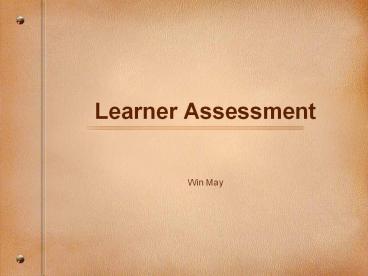Learner Assessment - PowerPoint PPT Presentation
Title:
Learner Assessment
Description:
Learner Assessment Win May What is Assessment? Process of gathering and discussing information from multiple sources to gain deep understanding of what learners know ... – PowerPoint PPT presentation
Number of Views:142
Avg rating:3.0/5.0
Title: Learner Assessment
1
Learner Assessment
- Win May
2
What is Assessment?
- Process of gathering and discussing information
from multiple sources - to gain
- deep understanding of what learners
- know, understand and can do
3
Purpose of Assessment
- Subsequent learning
- improve
- Assessment Results
4
Learner-Centered Assessment
- What is it that my learners need to know and be
able to do during their professional lives? - What skills and knowledge will stand the test of
time, given the rapidly evolving nature of
knowledge?
5
Characteristics of Learner-Centered Assessment
- Promotes high expectations
- Respects diverse talents and learning styles
- Promotes coherence in learning
- Integrates education experience
- Actively involves learners
- Provides prompt feedback
- Fosters collaboration
- Huba Freed, 2000
6
Competence in Medical Education
- Habitual and judicious use of
- Communication
- Knowledge
- Technical skills
- Clinical reasoning
- Emotions
- Values
- Reflection
- in daily practice for the benefit of individuals
communities being served. - Epstein Hundert, 2002
7
Assessment of Competence
- Insight into actual performance
- Capacity to
- adapt to change
- find and generate new knowledge
- improve overall performance
- Fraser Greenhalgh, 2001
8
Pyramid of Competence
9
Goals of Assessment
- Optimize capacities through self-directed
learning - Identify incompetent physicians
- Provide basis for selecting applicants for
advanced training
10
Types of Assessment
- Formative
- Guide future learning
- Promote reflection
- Motivate
- Shape values
- Summative
- Certify
- Promote
11
Which is the best method?
- Valid
- Reliable
- Appropriate to the objective
- Feasible
- Acceptable to faculty and learners
- Cost-effective
- Impacts future learning and practice
12
Types of Learner Assessment
- Written exercises
- Case-based module
- Multiple choice questions
- Short-answer questions
- Structured essays
- Key feature and script-concordance questions
- Paper/Thesis/Project
- Assessments by supervisors
- Chart-stimulated recall
- Product review
- Standardized oral examination
- Global ratings
- Structured direct observation
13
Types of Learner Assessment
- Clinical simulations
- Standardized patients
- Multi-station examinations
- Unannounced standardized patients
- High-tech simulators
- Multi-source assessments
- Portfolio
- Peer assessment
- Patient assessment
- Self-assessment
14
Some methods to assess cognitive skills
Assessment Method Domain Domain Strengths Limitations
Assessment Method Domain Domain
MCQ Knowledge, Problem-solving Knowledge, Problem-solving Many content areas High reliability Computer grading Difficult to write Cueing
SCT Knowledge, Problem-solving Clinical problem-solving Computer grading Transfer not yet proven
15
Table of Specifications
No. Content Area Recall of facts Application/ Interpretation Synthesis/ Problem-solving Total
1. Oro-pharyngeal cancer 1 2 2 5
2. Myocardial infarction 1 1 3 5
16
Multi-method Assessment
- Each method has limitations
- Essential to use multiple methods
- Allows inclusion of wider content areas
- Multiple points of view
17
Outcomes - Based Education
- 3 circles of outcomes
- Inner circle
- What the doctor is able to do
- Middle circle
- How the doctors approach their practice
- Outer circle
- Doctor as a professional
18
What the doctor is able to do
- Apply skills of history and PE
- Communication skills
- Health promotion disease prevention
- Procedural skills
- Investigative skills
- Management skills
19
How doctors approach their practice
- Apply basic sciences to clinical practice
- Use critical thinking, problem solving, clinical
reasoning - Incorporate appropriate attitudes, ethics and
understanding legal issues - Information retrieval and handling skills
20
Doctor as professional
- Role of doctor within health care system
- Aptitude for professional development and
transferable skills
21
Summary
- Assess competence in an integrated, coherent, and
longitudinal fashion - Know limitations of each method
- Use multiple methods
- Implement longitudinally
- Provide frequent and constructive feedback































